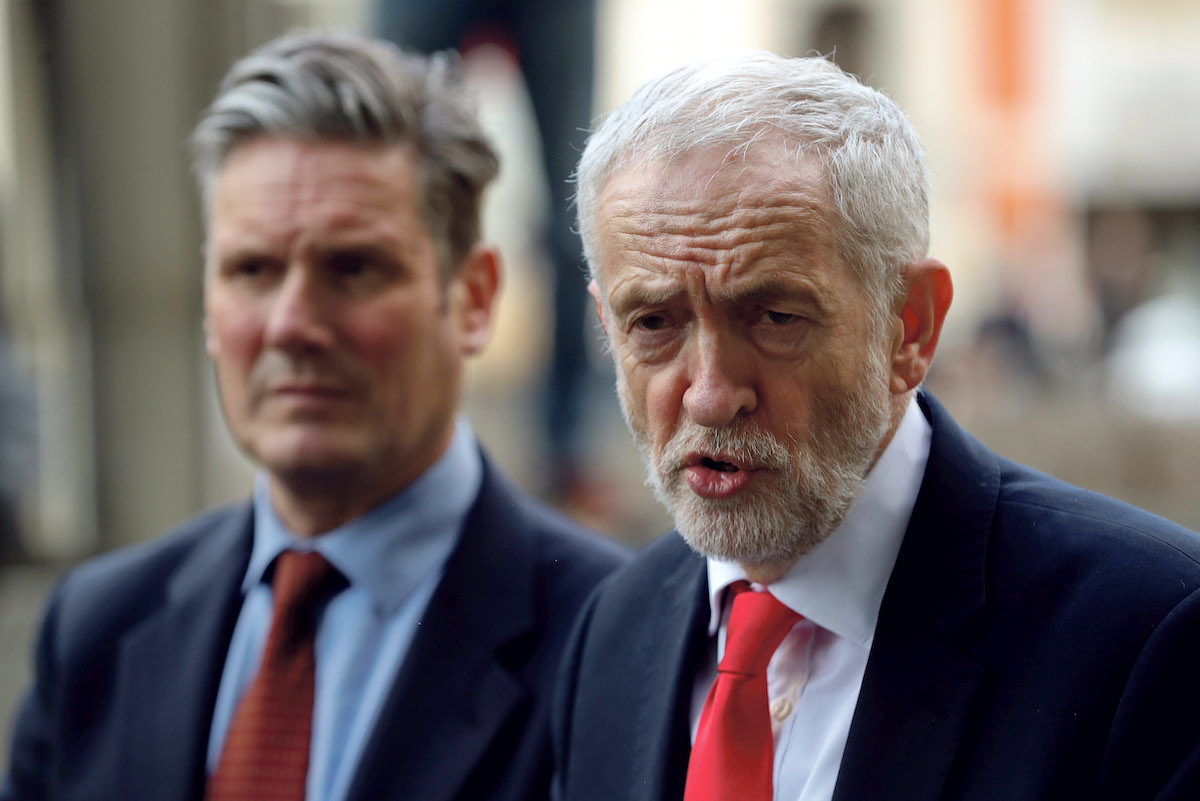Keir Starmer calls for ‘culture change’ to win back Jewish voters
Labour leader tells more than 1,000 viewers at Limmud festival: 'You have got to lead from the top. If the person on top does not model that behaviour, you do not have a chance'
Sir Keir Starmer has called for a “culture change” in the Labour Party in a bid to win back Jewish members and voters.
Speaking at the annual Limmud Festival on Monday morning, the Labour Leader spoke about his position on faith schools and the Israeli-Palestinian conflict, distancing himself from a Labour call for a ban on West Bank imports.
In the wide-ranging hour-long interview – which was attended online by more than 1,000 people – Sir Keir, whose wife is Jewish, also spoke about celebrating Friday night over Zoom with his family during the pandemic. He reflected on his background and his admiration for former Tory Prime Minister Theresa May.
Responding to calls for change in the party, Sir Keir told viewers that he acknowledged it would take time to win back the confidence of voters alienated under former leader Jeremy Corbyn.
Sir Keir, who was elected as leader of the Labour Party in April, said: “In my experience, culture change is the hardest of the lot. You can change the rules, but the culture is much harder.”
Saying he wanted the Labour Party to welcome people of all faiths and backgrounds, Sir Keir added: “You have got to lead from the top. If the person on top does not model that behaviour, you do not have a chance.
“The other thing I have learnt is you need a critical mass of people with you on the journey who want to change the culture.”
Talking about antisemitism in the Labour Party, he said: “We are taking steps in the right direction, but these things take time and you have to be consistent and persistent.
“We will change our processes and our rules, but that on its own won’t be enough.”
He added: “Lots of Jewish friends and leaders said to me, we will judge you by what you do; not what you say. We are in that process.”
He added: “We are doing this in good faith but we are going to make mistakes along the way. We need to be prodded on it and respond to it – and sometimes, say ‘sorry, we got it wrong’. The power of saying that is huge.”
He criticised organisations that “circle wagons” to avoid an apology: “Don’t try to defend a bad decision. The Labour Party needs to learn that as well.”
We are doing this in good faith but we are going to make mistakes along the way. We need to be prodded on it and respond to it – and sometimes, say ‘sorry, we got it wrong’. The power of saying that is huge
Sir Keir went onto defend his decision to serve in the Shadow Cabinet under Mr Corbyn.
He said: “I thought it was better to stay and try and change things; others thought it was better to leave.
“I thought it was better to make the arguments that needed to be made in the Shadow Cabinet.
“I took the view that if you are in a party you stay in and fight for change; other people took a different view.”
He added: “I am very conscious now that as leader of the Labour Party, it falls to me to bring about that change.”
Sir Keir went onto criticise his predecessor after the Equality and Human Rights Commission into antisemitism in the Labour Party found it had breached the Equality Act and that there had been 23 instances of “inappropriate involvement” from Mr Corbyn’s office.
Sir Keir said he was keen to “apologise unreservedly”. He went onto say he was “disappointed” by Mr Corbyn’s decision to describe the scale of antisemitism in the party as “dramatically overstated”. Mr Corbyn was suspended from Labour in October over his failure to retract his comments.

“It fundamentally cut across all that work in doing the right thing,” Sir Keir told viewers.
“I think we can make up for lost ground, but I can’t take you how disappointed I was in his response.”
Sir Keir was appointed leader of the Labour Party in April. After serving as Director of Public Prosecutions and head of the Crown Prosecution Service, he went onto sit as MP for Holborn and St Pancras in 2015 – the constituency he continues to serve.
The former lawyer spoke about the American political influence on the Israeli-Palestinian conflict – but distanced himself from comments made by his Shadow Foreign Secretary Lisa Nandy.
In June, Ms Nandy called for a ban on imports of West Bank goods if
Israel continued with annexation plans. Sir Keir, who said he had a good relationship with the Israeli Labour Party, distanced himself from the position, saying: “I am not a big fan on bans on imports. I don’t think that is the right way to go.”
He said he hoped a two-state solution agreement could be brokered with the support of the incoming US President, Joe Biden.
“I did not agree with the Trump plan, I think annexation with be wrong. I hope with Joe Biden, we will open a space for dialogue that has been missing.
“I am in the space of saying, ‘let’s work with the Biden administration’. I think that change in America is hugely important.”
He described incoming President Biden as “more of an open politician looking for international peaceful settlements”.
Asked about his position on faith, Sir Keir, 58, described it as “hugely important.
“I think it speaks to the spirit of people. You see it clearly when we go through difficult times.”
Sir Keir said he looked forward to celebrating Friday Night prayers as a family – adding that since the pandemic, Shabbat prayers with their extended family have taken place over Zoom.
The father-of-two described his family as an “odd bunch”, noting that while his wife’s family is Jewish, he was raised under the Church of England. He said he looked forward to the weekly religious tradition and the family time it gave him away from the “million things” there is to do as leader of the Labour Party.
Sir Keir went onto talk about faith schools, adding: “I do not have any issue with faith schools. We need different schools with lots of diversity.”
During the online event, Sir Keir, who was named after Labour Party founder Keir Hardie, reflected on his youth – nothing that “ten-year-old Keir Starmer” would have ambitions to be a “footballer”, noting that he had never met a lawyer or politician growing up.
Sir Keir, who joined the East Surrey Young Socialists group as a teenager, reflected on growing up on the Surrey-Kent border as the son of a toolmaker and nurse.
“I literally had never met a lawyer,” said Sir Keir.
“Even by the time I went to university, I did not really know what the difference was between a barrister or solicitor – so it did not occur to me.”
He added: “I was oblivious to what a DPP or politician does.” Encouraged by his parents, Sir Keir went onto read law at Leeds University. “I was interested in going into politics in some shape or form, but my parents said law is much better.”
He describes his second year as a “turning point’, where he learnt more about international human rights law and the agreements that were struck after the Second World War.
“The idea of the world coming together and signing instruments saying human rights were universal and applied to everyone was hugely important to me – and that states were accountable to each other,” he said. “It went really deep.”
He said young people should have “some power and some influence,” adding that: “I strongly believe in votes at 16.
“Young people had a really tough decade. Austerity did very little for young people.”
However, reflecting on his political colleagues, Sir Keir said he did not subscribe to the view all Labour Party politicians were “goodies” and the Tories were “baddies”. Asked which Tory politician he most admired, Sir Keir said: “I had a degree of admiration for Teresa May. I knew what her moral framework was.”
Sir Keir made the comments at the annual Limmud Festival on Monday morning, which took place online over Zoom as a result of gathering restrictions imposed by COVID-19.
At the end of the session, Limmud Trustee Carolyn Bogush, who had interviewed Sir Keir during the session, encouraged viewers to “unmute” their microphones to applaud Sir Keir at the end of the session.

Thank you for helping to make Jewish News the leading source of news and opinion for the UK Jewish community. Today we're asking for your invaluable help to continue putting our community first in everything we do.
For as little as £5 a month you can help sustain the vital work we do in celebrating and standing up for Jewish life in Britain.
Jewish News holds our community together and keeps us connected. Like a synagogue, it’s where people turn to feel part of something bigger. It also proudly shows the rest of Britain the vibrancy and rich culture of modern Jewish life.
You can make a quick and easy one-off or monthly contribution of £5, £10, £20 or any other sum you’re comfortable with.
100% of your donation will help us continue celebrating our community, in all its dynamic diversity...
Engaging
Being a community platform means so much more than producing a newspaper and website. One of our proudest roles is media partnering with our invaluable charities to amplify the outstanding work they do to help us all.
Celebrating
There’s no shortage of oys in the world but Jewish News takes every opportunity to celebrate the joys too, through projects like Night of Heroes, 40 Under 40 and other compelling countdowns that make the community kvell with pride.
Pioneering
In the first collaboration between media outlets from different faiths, Jewish News worked with British Muslim TV and Church Times to produce a list of young activists leading the way on interfaith understanding.
Campaigning
Royal Mail issued a stamp honouring Holocaust hero Sir Nicholas Winton after a Jewish News campaign attracted more than 100,000 backers. Jewish Newsalso produces special editions of the paper highlighting pressing issues including mental health and Holocaust remembrance.
Easy access
In an age when news is readily accessible, Jewish News provides high-quality content free online and offline, removing any financial barriers to connecting people.
Voice of our community to wider society
The Jewish News team regularly appears on TV, radio and on the pages of the national press to comment on stories about the Jewish community. Easy access to the paper on the streets of London also means Jewish News provides an invaluable window into the community for the country at large.
We hope you agree all this is worth preserving.






















